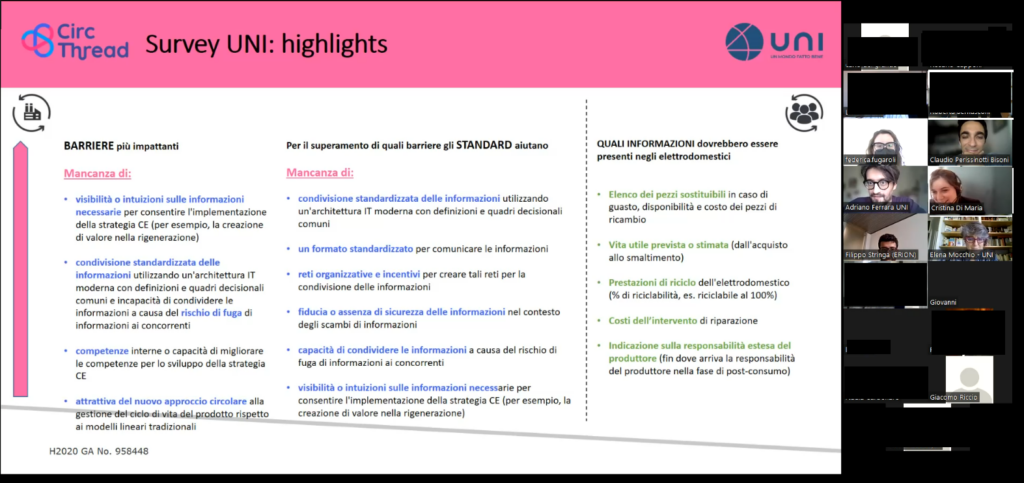Last April 28th was held online the workshop “Barriers to circular economy” organized and hosted by UNI, Italian standardization body.
The workshop is part of the CircThread project (Building the Digital Thread for Circular Economy Product, Resource & Service Management).
About twenty people participated in the workshop. Individuals from university, standardization organizations, SMEs (developers of appliances components), multinational companies (OEM), star-ups, lobbying associations (Italian appliances producers at national and local level), consumers’ associations and an electronic waste management consortium.
The workshop began with a brief introduction to the CircThread project and its intention to create a platform that shares information throughout the life cycle of household appliances to improve the possibility of reusing raw materials before they become waste, and when they are no longer recoverable to help consumers make more informed decisions.
To start the project, it has been fundamental to analyze the existing barriers to information exchange by analyzing the existing scientific literature.

The aim of the workshop was to discuss the results of 2 surveys made by UNI, about:
Survey 1
The barriers from the studied emerging literature, with a focus on information exchange and the potential role of the standardization, involving stakeholders coming from different backgrounds (industries consumers and research and university bodies).
The aim of the survey was to identify the most relevant project barriers and how standardization could help to overcome them.
Survey 2
The information that consumers consider useful to have on the appliances they use, to concretely start a circular economy in this sector.
The objective was to identify the most relevant information (useful to have on appliances), to concretely start a circular economy in this sector.
Roundtable
The last part of the workshop was a roundtable, an open dialogue during which each the participants were free to give their point of view/solution about the topics discussed so far: digital thread and solutions; end of waste and legal issues; repairability, and Network to work together.
Among all the aspects discussed, the accessibility of ICT products for people with disabilities came up.
People with disabilities may have problem due to the lack of accessibility of information and this issue is also expanding to the household appliances sector. Some participants suggested to include (among relevant information to be shared) what are the accessibility features of the products considered. Also, documents should be provided in an accessible format for the category of users with disabilities. The lack of standards on how to make this information on these products accessible was pointed out.
The importance of working together was also a topic discussed. It was emphasized that there is a lack of communication between industry, research, and regulation. More communication between research, standardization and industry would facilitate the implementation of the circular economy concept. It’s not easy to always apply the research results to industries. Standardization has a predominant role in circular economy and these regulatory aspects are often unknown in the research sector. Researchers must imagine what a good design might look like (e.g., design methods to optimize disassembly) but when it comes to dealing with industries, there could be regulatory constraints that make it impossible the implementation of the solutions.
An effective implementation of circular economy in the appliance sector needs the contributions of all stakeholders of the market. Circthread will try to internalize the market feedbacks: at this end it will try at facing (whenever it is possible) the issues emerged and to ensure the delivery of a digital platform useful for all the actors on the market.